Chinua Achebe, 1930-2013
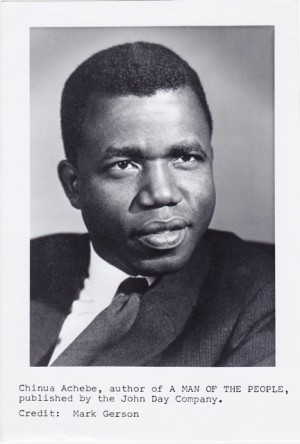
“The time has come round to a change in millennia when, history tells us, all kinds of excitable people are apt to go bonkers; when even more equable souls like ourselves may get high on prophecies. The last time around W.E.B. Du Bois had held high hopes for the twentieth century on the matter of race. Mindful of that, alas, unfinished business, my hope for the twenty-first is that it will see the first fruits of the balance of stories among the world’s peoples. The twentieth century for all its many faults did witness a significant beginning, in Africa and elsewhere in the so-called Third World, of the process of ‘re-storying’ peoples who had been knocked silent by the trauma of all kinds of dispossession. I was lucky to be present at one theater of that reclamation. And I know that such a tremendously potent and complex human reinvention of self — calling, as it must do, on every faculty of mind and soul and spirit; drawing as it must, from every resource of memory and imagination and from a familiarity with our history, our arts and culture; but also from an unflinching consciousness of the flaw that blemished our inheritance — such an enterprise could not be expected to be easy. And it has not been. […]
“An erosion of self-esteem is one of the commonest symptoms of dispossession. It does not occur only at the naive level…; even more troubling is when it comes in the company of sophistication and learning. It may then take the form of an excessive eagerness to demonstrate flair and worldliness; a facility to tag on to whatever the metropolis says is the latest movement, without asking the commonsense question: later than what? Let us imagine a man who stumbles into an alien ritual in its closing stages when the devotees are winding down to a concluding chorus of amens, and who immediately and enthusiastically takes up the singing with such loudness and gusto that the owners of the ritual stop their singing and turn, one and all, to look in wonder at this postmodernist stranger. Their wonder increases tenfold when they ask the visitor later what kind of modernism his people had had, and it transpires that neither he nor his people had ever heard the word modernism…. [E]ccentricities such as his can liven up the gathering and may even save it from righteousness and solemnity; but in the final reckoning the people who will advance the universal conversation will be not copycats but those able to bring hitherto untold stories, along with new ways of telling.”
— Chinua Achebe, from Home and Exile, 2000.
"Daily Show" Writer Jason Ross On Writing For Free and Breaking Into Comedy
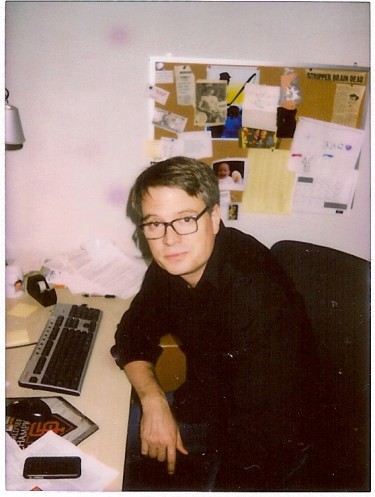
Since 2002, Jason Ross (@jasonjross on Twitter) has been a writer for “The Daily Show With Jon Stewart,” where his team has won a half-dozen Emmy Awards for outstanding writing and produced the best-selling America: The Book and Earth: The Book.
Jason Ross: Here I am.
Ken Layne: Hello, sir! I’m in the middle of the greatest consumer survey in human history.
Jason: That is a fairly low bar to clear.
Ken: Disneyland is building Star Wars Land. This will make Disneyland much more tolerable for me:
Which of the following Star Wars locations would you be especially interested in visiting at the Disneyland Resort? Please select all that apply. Move your mouse over each to view location.
Jason: OK. That’s worth moving a mouse over each location for…
Ken: Anyway, there’s a lot of talk these days about “writing for free” and whether that’s a new paradigm of exploitation and etc., and I thought we could talk about that in the context of becoming a professional comedy writer. But first, we must introduce you!
Jason: Should I … ? OK. My name is Jason Ross and I am a writer for “The Daily Show with Jon Stewart.” Is that … ?
Ken: Shoe size. They can figure out the rest from “shoe size.” No, that is fine. Now, you were produced by the same excellent environment that produces Sierra Nevada Pale Ale, is that right?
Jason: I hail from Chico, California, which produces Sierra Nevada brews of all types. Also lots of almonds. And marijuana. And rice.
Ken: A good vegetarian diet. So between college and about 1998 when I remember hearing that you were embarking upon a comedy career, what did you do?
Jason: I came out of UCSB and the student paper there, the Daily Nexus. After that, I went up in the hills to write my novel and learn to fly fish. Let’s just say the fishing went a lot better than the writing. It was time for a job and soon I was working at Chico’s alt weekly, the News & Review. I worked there as a writer and editor for three-plus years and decided it was time to move to New York. I had the idea of becoming a magazine writer but quickly became discouraged at how difficult and uncertain that life would be. If life was going to be so difficult and uncertain, I might as well feel that way in pursuit of something incredibly fun and rewarding. I became a comedy writer. In my own mind. You and Charlie [Hornberger, co-editor of Tabloid.net] were a couple of the first people to know.
Ken: And we were having fun, but the money was a bit of a struggle at that point.
Jason: Quite.
Ken: There were some magazine writers from that crowd, too, and all the ones I remember were usually broke and eventually did something else.
Jason: Like shoot themselves in the back of the mouth?
Ken: We try not to talk about the thousands of suicides, but probably. The Onion existed, and there was Mad Magazine on the newsstand… National Lampoon was gone, not a lot in the way of humor outlets besides TV. But there was the Web, pretty much open to whatever anybody wanted to do to it.
Jason: Yeah, McSweeney’s was up and running by then.
Ken: Around the time I could no longer live on cigarettes and fog, I left San Francisco and Tabloid and you began writing a lot of insane stuff, it seemed like three or four pieces a week for us. Probably one of the most absurd things we ever posted was a fake interview you did with something called “the Man Cow,” I think?
Jason: Yeah, I later found out that was the name of a shock jock. I was spending some savings, writing a “News Radio” spec script and shooting of stuff to Tabloid when the ideas struck me. (My Man Cow was the product of GM farming.)
Ken: Haha, I wrongly remember that as a deliberate parody of that shock jock with a similar name (cow man?) who had just caused some huge ruckus at a California airport by doing a Bill Clinton stunt… getting a haircut on the runway, which I think ended up being a Fox News myth anyway, that Clinton had done that. This is just one of many examples of comedy being magic.
Jason: Some of my favorite jokes as a kid were Steve Martin and Johnny Carson jokes I don’t get (because I was a kid) so they just sounded like nonsense to me.
Ken: Oh me too. I thought “Winslow Boner” was the funniest thing I’d ever read, in Steve Martin’s book Cruel Shoes, and years later in art class I learn that it was about Winslow Homer.
Jason: That is DEFINITELY funnier without the referent.
Ken: I also had never read the “Gift of the Magi,” so the story “Cruel Shoes” was just completely out of the blue and fantastic.
Jason: Oh god. I never even made the connection…
But they were clips! (I don’t know if people still say “clips.”) And with this portfolio, along with a winning personality, you were able to get a low-paying job at a website.
Ken: It’s probably a good idea for little kids who like comedy to just read and listen to as much as possible, get a head full of Richard Pryor race humor and George Carlin drug jokes and then go freak out the 25-year-old teacher-squares at elementary school. Anyway, in my own mind. we never paid you at Tabloid. We didn’t pay anyone. How did you feel about this sexploitation?
Jason: I assumed you just lost the invoice.
Ken: We smoked the invoice. (That’s drug humor, if you’re reading this to your kids.)
Jason: Kid: “You mean the way we smoke gouda?”
Ken: 🙁
Jason: Those pieces were my first attempts at published humor. Having them accepted and presented to the world was all I wanted. Also, I knew that you and Charlie weren’t raking it in, so it wasn’t like I was actually being financially exploited.
Ken: I dreamed of paying people. Actually had dreams about that. I remember people saying at the time, “Oh, don’t you want to sell Tabloid.net and get rich” and I would think, “No, I just want a job doing this.”
Jason: Wrong answer, bro.
Ken: The people asking also didn’t have any money. But, I am fine with the eventual fate of everything. Which is the Void.
Jason: BRING ON THE VOID.
Ken: It’s coming, on its own schedule. Now where else did you get these early comedy pieces published?
Jason: I had two pieces on McSweeneys.net and… and… That would be about it. They didn’t pay either.
Ken: But they were clips! (I don’t know if people still say “clips.”) And with this portfolio, along with a winning personality, you were able to get a low-paying job at a website.
Jason: No bullshit: In 2000, I was working for an ad agency, miserable, when I spotted an ad for a comedy writer for a comedy website startup. One of the job requirements was experience with online comedy. I wrote a brief introduction email and then pasted in those URLs. They were my entire resume. And I got the job!
Ken: Incredible. We should say that in 2000, websites were the “mail room” of most media companies.
Jason: This one was going to be HUGE. It was called iCast. It belonged to that giant incubator in Boston… ICBM?… That can’t be it.
Ken: Ah, a dot-com startup! Okay, different scene altogether. Because at this point, newspaper websites usually weren’t even run from the same building as the “real” paper. They were in … well, a real example: Ed Mazza, who did a lot of Tabloid stuff, got hired at (I think?) the New York Daily News website, and it was a closet. A utility closet. Maybe that wasn’t even Ed, though, and it might’ve been a different paper, or city.
Jason: This had like four sections: film, music, comedy and…
wait for it… MAGIC!!!
Ken: MAGIC???
Jason: I saw a PowerPoint headline that said this: “We can WIN in magic”
Ken: Like, performance magic? Or secret word magic?
Jason: They signed some kind of deal with David Blaine, but I never saw how they planned to make magic online. Look, it’s a GIF… but it’s MOOOOOOVING!
Ken: I will pitch this to The Awl or Gawker or something… a new site, about stage magicians. The majesty, the costumes. Or whatever David Blaine does, magic by the subway ticket machine. Toilet magic.
Jason: The startup never launched, so it all died in utero. But I distinctly remember a screensaver of the Last Supper, except everybody in the picture is just pigging out. Very funny, not my idea. The boss there was John Wooden, who made Chickenhead. It was silly non-sequitur stuff, mostly. So that job lasted seven weeks, but then the editor from that site, Todd Jackson, went on to edit Comedy Central’s website, and a few months later he hired me.
Ken: Okay, so here is the secret ingredient: The one guy from the failed startup brings some of his people to his next job.
Jason: Yep.
Ken: At that time, Comedy Central didn’t have much going on online, is that right? (This will be instructive for the terrible 20-somethings who assume we always watched teevee shows on the computer.)
Jason: It was much more primitive than today. There was no video server for recent episodes. Most of the job was writing promotional “touts” for upcoming shows. Those had to change every day. But there was, for a few months, a dream that this little office of people were going to be a source of original online comedy content. Then they fired that VP and we just became a promotional arm of the network.
Ken: RIGHT, that was the idea when you started, I remember this now: Original web comedy for the Comedy Central channel’s website, a sort of farm team.
Jason: Well, “farm team” is a little hopeful. It’s not like people were getting called up to work at the shows on a regular basis.
Ken: But it was pretty new, the whole “websites as an adjunct to other mediums,” so there must have been some hope that you and your coworkers would be doing comedy for the bigger audience at some point?
Jason: We were proud of our work (when it was good), and I’d guess that maybe a quarter of the staff there had pretensions of doing “real” comedy some day. Others seemed content to be Web producers, graphic designers, etc.
Ken: How did you get from that promotional website office to the writer’s room on the “Daily Show”?
Jason: Practice!
Ken: The answer is “Google maps.”
Jason: I actually might have gotten this job without the ComedyCentral.com connection, because I was friendly by that time with the head writer on the show, who invited me to write a submission when they were hiring. At this point, I’d been an aspiring comedy writer for five years, and I’d done a little bit of stand-up and a lot of hanging-on to other, more successful comedy people.
Ken: So this is the New York comedy club scene of… early 2000s.
Jason: Yeah. Though I may have never been to an actual comedy club. It was happening in bars downtown, at the UCB theater, which at that point was a tiny garret off Union Square.
Ken: At some point between 2000 and 2004, “The Daily Show” became a huge thing. I remember being at… Craig Kilborn’s “Late Late Show”? I think so, yes, our friends in the band Tsar were doing the show and I went along, maybe summer of 2000. And I met your current boss, Jon Stewart, just saying hi on the smoking patio at CBS in Los Angeles — I assume he was doing the “Daily Show” in Los Angeles that week, or maybe he was taping for Kilborn’s show because Kilborn used to host “Daily Show.” I have no idea, really. But nobody bothered him. Then by the time of the 2004 presidential election, people would mob him at the conventions, etc. And this is the era when you came in, right? By “this,” I mean during this transition from smart cable comedy show to national phenomenon.
Jason: Correlation isn’t always causation, but in this case ….
Ken: You did this. Through MAGIC.
Jason: I can WIN in magic! I came on in 2002. The show had already made its mark in the 2000 election but Jon’s vision for it kept getting sharper and more elegant as he found his footing.
Ken: From my terminally underemployed comedy writer friends in Los Angeles, I’ve heard there’s this pyramid of pay, from staff on a hit network show to a mid-season replacement writer on a cable reality thing that’s not even supposed to be scripted, etc. Where was the “Daily Show” in 2002 on that scale, and where would you guess it is today?
But do work for free if you see a clear path from that work to a better situation down the road. Comedy’s a perverse world where 90% of the people work for peanuts and 10% do embarrassingly well.
Jason: It was always better than what a reality writer makes, but when I started it was somewhat less than comparable late-night shows. (In your hierarchy, late-night writers are probably right in the middle — less than sitcom writers, more than most other TV employees.) When the show became a Writers Guild of America signatory in 2006, I got about a 50% raise. Currently, we’re probably in the middle of the pack, pay-wise.
Ken: Oh so you’re a fancy union member now. How’s caviar taste, Jason?
Jason: Salty.
Ken: You know where almost all caviar comes from now? Salmon farms in the Sierra Nevada foothills. Not so fancy since we destroyed all the wild salmon rivers. Here is what I think is the best part of your job: You won’t ever get canceled. Sure, Jon Stewart will eventually be replaced by an 88-year-old Jay Leno, but the show is not going anywhere as long as there are idiots making the news.
Jason: Yeah, Jon will never be canceled because Jon will never phone in a single day. And I thought caviar was sturgeon roe.
Ken: That is the traditional definition: wild sturgeon roe from the Caspian and Black Sea. But we killed most of the wild sturgeon long ago.
Jason: They had it coming.
Ken: Now you are probably buying farmed salmon eggs, or even trout eggs. There’s one wild sturgeon watershed full of caviar that still exists, in Iran I think, and we’ll probably nuke that.
Jason: Not the Columbia? There are still guys who catch them in the Sacramento, just outside of Chico. But maybe you’re talking about a harvestable fishery.
Ken: The Columbia River is all dammed up, but yeah, there is restoration going on. And even some caviar poaching!
Jason: Now THIS is what I want to talk about.
Ken: This is what happens when you get a fly fisherman and an extremist environmentalist talking about comedy salaries.
Jason: Every fucking time…
Ken: Here is something I wrote about caviar not long ago. I’m giving you the Google cache because apparently The Awl is being hacked right now. And I don’t want to shut down the “Daily Show” with malware.
Jason: Congratulations!
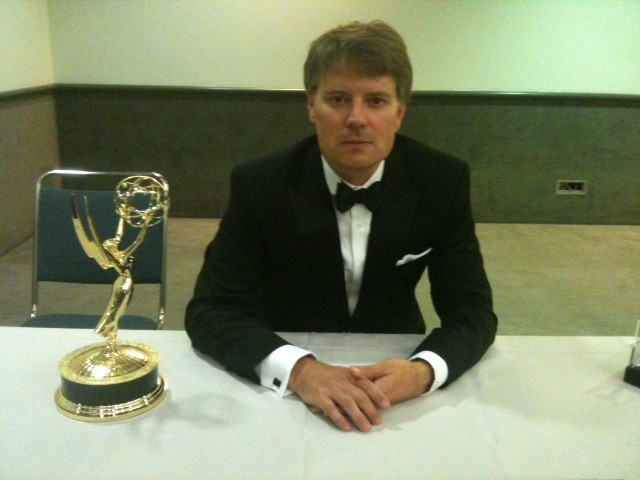
Ken: You have an Emmy, or actually many Emmy awards! I saw a Bob Dylan show a few years ago and he had his Oscar on his guitar amp. Where do you keep your golden idol?
Jason: I don’t have an amp. They sit atop a bookcase in our living room.
Ken: I thought you were doing pretty well for yourself, and you don’t even have an amp. Well at least you have something to put on a bookcase.
Jason: I can afford an amp. I can’t afford the extra room where my amp goes.
Ken: I forgot to ask if you let your kids play with your Emmy. But you keep it on a bookshelf, which is where we put things the kids can never, ever touch or even think about. So let’s wrap this up so you can go back to your 10,000-square-foot Williamsburg penthouse and write comedy, remotely —
Jason: Wrong, DEFINITELY wrong, and wrong.
Ken: Everyone in New York has a 10,000 foot penthouse, I know this. What is the most fun, most rewarding part of being on that staff?
Jason: Two meetings a day of 20-odd funny people where it’s pretty much everyone’s job to try to make each other laugh. Plus catered lunch. Now about working for free ….
Ken: Yes! That is our topic, or it was?
Jason: I’d say in general, don’t work for free if it’s for a big company that’s making — or could make — real money off your work. Think about the bitterness of the Huffington Post bloggers who watched their “can’t-pay-you” boss sell the company for $315 million. But do work for free if you see a clear path from that work to a better situation down the road. Comedy’s a perverse world where 90% of the people work for peanuts and 10% do embarrassingly well. If you want to break in, you have to suffer. But at least you know which direction you’re aiming.
Ken: That is wise. Whenever there’s a system in place for people working for free, like a pen where they’re kept and expected to stay while producing free intellectual property, probably you don’t stay around there beyond a summer internship while you’re in school. Because I learned from watching The Ten Commandments that that’s morally wrong, and you should rise up, etc.
Jason: Speaking of a ruined watershed…
Ken: Filled with Biblical slave blood, so bad for wetlands. I will link to your CSU Chico speech that I found last week, too, because it is very instructive and thoughtful. Oh, and plug your next standup or any project, I forgot I am doing a TV-related thing here.
Jason: No plug.
Ken: Okay! Well, thank you for this!
Jason: Thanks, Ken. It was fun. When can I expect the check? See what I did there????
Ken: Right away! Should say “The Awl” on the envelope, or “OPEN AT ONCE, Department of the Treasury: Internal Revenue Service,” etc.
Jason: I just got that last week! You guys work fast.
New York City, March 20, 2013

★★★ Spring had arrived shortly after 7 in the morning, under the procrastinating auspices of the snooze button. You could not fault it for brightness; the occasional little cloud impeded the sun just enough to emphasize how generous the situation was, with respect to light. And dry, it was dry. A worker was cranking back the awning in front of a restaurant. If you were wearing a wool coat over a jacket, in the upset context of the equinox, you could even consider it comfortable.
New York City, March 19, 2013

★★★ Dawn was the dim anticlimax of rain on snow: dark pavement, gray river, gray sky. Through the hours, the rain gradually stippled forth the green turf again, then stopped falling. The clouds brightened, and then a whole new day burst out, blue and brilliant. Sky and brick shone in the puddles in the shadowy depths under the scaffolding, with meltwater dripping through every opening, and where the wetness didn’t amount to puddles, blue and ocher tones shaded the concrete. March does not come in like this or go out like that; March is a wee lamb stumbling around on great crushing paws; March is a ferocious lion with tiny grazing jaws and a fleecy bobtail. Shoots of flower bulbs were poking up through the snow still in the planters. There were sneakers in the window of the Ugg store. Sun shot through the gap where the luxury tower has not gone up yet, flooding the wide unscaffolded sidewalk with light and almost warmth.
What's The Rush?
Bad news about the universe.

I tend to vacillate between a) pretending that nothing really matters because our existence, no matter how highly evolved we like to tell ourselves we are, is essentially a meaningless and arbitrary journey through a course fraught with obstacles both external and self-made in which we think we are choosing our own direction when in reality we are being pushed along by a collection of chemicals whose only goal is to spread their own ingredients regardless of the damage it does to their current host and b) cowering in the corner when confronted by the certainty that there’s no actual need to pretend, because it’s all true. In those bleak moments of awareness the most frightening thing to consider, apart from the almost unbearable solitude that no amount of excess can ever fully alleviate, is not that the future will bring with it some kind of chaotic change but that it will essentially be pretty much the same as it is now, except more humid. This is the best it’s going to be, and that’s way worse than what you thought was intolerable even a year ago. It doesn’t much help to learn that the universe is even older than previously projected, and expanding more slowly than earlier estimates had assumed. So it looks like we’re going to be here for a while. Nobody will blame you if you decide that you might as well take another shot at getting through Infinite Jest or ‘House of Cards.’
David Grann, What Is Up With Your Twitter?
David Grann, What Is Up With Your Twitter?
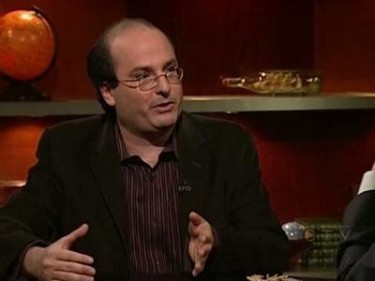
Last week, David Grann and I met in his office at The New Yorker, in midtown Manhattan. It is a glorious fire hazard because he doesn’t throw anything away. Grann has been a staff writer at the magazine since 2003 and published two books, the enthralling The Lost City of Z, and The Devil and Sherlock Holmes, a collection of his reportage. Stacks of papers related to finished stories (“That’s Z, that’s Cuba, that’s Willingham…”) line the walls, while the floor is devoted to a book-in-progress, as yet untitled, on the Osage Indian murders and the birth of the Federal Bureau of Investigation.
For fans, a new David Grann story is an immediate must-read. As diverse as the subjects, the through-line of his articles is their attention to odd facts, the surprising twists that he always seems to uncover on his way to getting the full story. His Twitter account, launched in May of last year and, when we met, closing in on 15,000 followers, has a similar appeal. He’s delightfully catholic in the things he tweets about; on March 19, he mentioned, successively, Jack Kerouac, a giant crab and the world’s largest sweater. And so, while it’s a slim part of his work, I wanted to talk to him about his daily reading, how he gets story ideas, and generally what’s made @DavidGrann so fascinating.
Elon Green: So when you first started, were you prepared for the level of interactivity on Twitter?
David Grann: No. The whole thing is still too new to me. I do have some virtual friends now that I quite like. I value the interactivity, whether someone tweets a link on physics or stars; I don’t know anything about these things!
Tweeting is the antithesis of when I report, where I spend six months to a year learning about something. I don’t actually go through my normal processes of evaluation. The biggest difference with Twitter and writing longform is you’re part of a virtual community where you know people, or think you know them, through their links. And when I do the longform, I don’t want to be conscious of an external world. I want to make sure I’m seeing just the story, and not have things refracted or a group mentality. It’s fine if I’m watching the Oscars or the Super Bowl, to be part of this wonderful community also watching this event. I can feel like I’m at a cocktail party. I’m pretty shy, too, so that’s kind of nice. But if I’m working on a story, I would never want those voices. I want the voices I’m reporting on, and all the participants, and I want to make sure I see the event as coldly, and clearly, and lucidly, and unemotionally, and uncollectively as possible. That’s the biggest difference. Oh, and one’s a lot of work and one is the illusion of work.
Why’d you start tweeting?
To be honest, I did it because Nick Thompson, an editor at The New Yorker, suggested I sign up. It wasn’t really a conscious decision to join.
Were you pressured?
No. You know, there was a part of me that always wanted to be an editor. Twitter is a way to curate things I really like, or that are interesting or curious. Sometimes it’s ephemera. I always would get up and read every morning, all my adult life, five to ten publications. This is part of being a news junkie and having a professional need to know what’s going on in the world. Frequently I find things I wouldn’t necessarily write about.
Did you have a model?
No. Honestly, I had no idea what to do on Twitter when I started. I didn’t follow it enough. Slowly, though, I started to realize what I’m okay at. Like, I’m just not particularly witty. And nobody necessarily — although I probably do too much of it — really gives a shit about what I think about the New York Giants’ play-calling. At some point, you have to realize there’s an audience out there. You know, when you’re getting on the plane and say, “The weather’s sunny,” tell that to your family. Don’t share it publicly.
I don’t really do that much commentary on Twitter. Mostly I just try to tap everybody else’s genius and send it out into the world — or, in some cases, their lack of genius. I generally try to avoid the links that many are sharing. I figure there’s enough people tweeting Paul Ryan introducing his budget, I’m not going to really add anything. Mostly, I send things out that are interesting and that people might not come across otherwise.
It seems like your daily routine includes the British papers.
Yeah, I read the British papers and foreign papers. In fact, that was one of the ways I look for story ideas. Twitter reflects people’s personalities, to some extent, and I’ve always had an affinity with the tabloids. I love tabloids. I tweet the Gothic tales because they’re just… Gothic.
What’s going on when you tweet? For some reason, I imagine you in your home office, wearing a bathrobe, cup of coffee in hand. How close is that?
The cup of coffee, definitely. It’s a big cup that I’m constantly nuking because it’s getting cold. I have to steal time to do it, in between all the random elements of daily routine and life.
I mean, that’s why I can’t blog, and even have trouble answering email. I always want to write everything just right, and edit it, so it’s takes me a long time. Twitter goes against all my habits; I try not to worry about it. I just send it out.
As you’ve gained followers, has that changed the way you approach things? Are you more conscious of what you’re doing?
No, but I’m hopefully a little better at it, after doing it more. At the beginning I really had no idea what Twitter was. I didn’t even have a fake account so I could follow people. It wasn’t because of any opposition. I’m kind of odd; I’m a technophobe who isn’t a technophobe. I’m afraid of new things, but eventually I love them. That happened with Twitter. I’ve started to figure out who to follow: people with different interests, someone who knows the art world, a physicist, politics people, your Knicks beat writer. I’ve got my NFL nose-in-the-draft.
Has Twitter, as a medium, affected your work habits at all?
It probably takes up more of my time than when I was just reading the papers. It’s made it easier to find a lot of great story ideas.
But it hasn’t actually resulted in a story that you’ve written.
No, because I’m working on a book. It would have otherwise.
What Twitter has done, though, is create an extended office culture, in a way, which is kind of nice. Where you see another side of colleagues. I like that because being a writer is pretty isolating, especially when I’m working on a book.
It takes you into another world, oftentimes, as well.
I mean, Canseco. That’s the greatest Twitter feed in the history of man. I don’t know if he’s conscious, but it’s brilliant performance art. It’s brilliant, every tweet. And this guy in outer space; It’s the greatest thing in the world! To be honest, I used to always procrastinate when I write. I mean, I love writing but I hate it. So when I get a few hours away I need to distract myself. And there’s nothing better than that. I’m getting a tweet from a dude in outer space. And he’s sending some clips and explaining some strange physical force. I saw the other day, he’s making a sandwich.
A lot of the stuff I tweet is out of childlike curiosity. You know, this guy took photographs of extra-large eyeballs that look like planets! That’s weird. You don’t want to spend a lot of time on it, but it’s worth noting. It made me kind of smile or flinch — one or the other.
What would make you stop tweeting?
I’d quit if it stopped being fun. I mean, it’s fun and informative and I like the virtual community. But if someone told me I had to stop, I would be fine. If someone told me I had to stop writing stories, that would be the end of me. That’s the difference.
Interview condensed, edited and lightly reordered.
You might also enjoy: The Mystery Of The 1969 Naked Esquire Photo Shoot
Elon Green is a contributing editor to Longform.
Hi, What Have You Guys Been Up To?
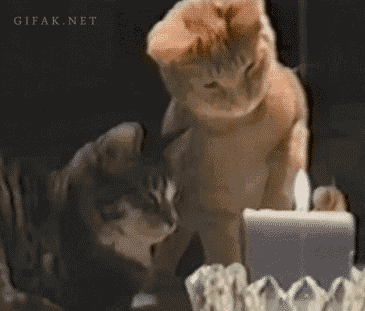
Oh hey everyone. What have you been up to? We were away for a little while but Big Google says we’re allowed to be on the Internet now and did we miss anything? Did anyone get fired from her job for complaining about something at a conference or anything?
Ask Polly: Should I Make The First Move On My Dream Girl?

Appearing here Wednesdays, Turning The Screw provides existential crisis counseling for the faint of heart. “Spare change for when your stock hits a 52-week low.”
Dear Polly,
I’m a 26-year-old guy who has been most flatteringly described recently as “not unattractive” (I’m relatively short and quite skinny). I’ve been “enamored” with this 20-year-old friend of mine, who is on the opposite side of the sexual appeal scale. Not only is she very beautiful, she’s also very charming and fun, and has plenty of suitors due to these particular qualities. To put it bluntly, she’s way out of my league.
The problem is, I’ve been interested in this girl for over a year. Initially, I asked her out and she replied that she saw me only as a friend, but if I could accept that, she would like to hang out with me (we usually go to the movies). In the meantime we’ve grown to be good friends. I find her easy to talk to, which for me is kind of rare. My feelings for her have not subsided. And I’ve been finding it very hard to know how to deal with the whole thing.
I honestly took her seriously when she said that she saw me only as friend, but I would be lying if I said that in the last year I wasn’t trying to make her change her mind. A few months ago, she even texted me, telling me she liked me a lot, which I took to mean she liked me as her friend a lot, but nonetheless meant a lot to me as an expression of affection. When I told her all this, she said “but I do like you,” again making me wonder if I should read more into it than a mere expression of friendly affection. Given that she knows how I feel about her, the fact that when we hang out she doesn’t “make a move” tells me that she hasn’t changed her mind. If I ask her to hang out with me, she usually does, but it’s never her who asks (except once, when she asked “so, when am I going to see you?”).
She does, however, ask me to go out with her and a group of friends sometimes. But I’m what you would call an introvert, and although the prospect of spending time with her makes me want to say yes, the idea of being just one of a big group of people scares the hell out of me, especially because I dread the idea of going out because of her just to have her spend more time with other members of the group.
I even fear this is why she’s not interested in me, thinking that what she sees as my reclusive personality will be an obstacle to a relationship. The thing is, I do believe (although I might be wrong) that if I had a romantic relationship with her, I would find it easier to go out more often, as I would be going out WITH HER, even in big groups: having her there WITH ME would have a soothing effect on my social anxiety, or at least I would want to go, instead of preferring not to.
So, should I talk to her about this (I’ve often thought of doing so, but I fear it might be too uncomfortable for her)? Should I ask her if there’s any possibility of her seeing me differently, as a romantic interest, given that when she told me she didn’t, she barely knew me compared to now? Should I ask her if her reticence is motivated by pure lack of attraction (and therefore insurmountable) or by some perceived incompatibility, which could be “negotiated”? Should I just shut up and try to kiss her, like a friend of mine says? Or should I just shut up, end of story, and be happy that she is a good friend?
Guy Who Can’t Think of a Funny Way To Describe Himself
Dear GWCTOAFWTDH,
Jesus fucking Christ. You know you’re not immortal, right? This is your one chance to be alive, and you want to go down in history as the guy who can’t think of a funny way to describe himself (beyond “not unattractive”), who’s been waiting around for a YEAR for one girl? You really want to be the guy who says he won’t be able to go out with a group until he’s magically validated by the gorgeous, outgoing supergirl of his dreams?
You’re like one of those really bland princesses in the old-school fairy tales, a hothouse flower waiting in a high tower for your savior to arrive on her white stallion and whisk you away from this life of pining in isolation. But no one’s going to save you, buttercup, until you save yourself. She doesn’t like you, trust me. No one likes a human void.
You need an injection of flair and confidence and verve, stat. You need to stop feeding the scampering, scared rat parts of your brain and start nourishing the calm, swaggery lion lobes. You need to dare to describe yourself in a funny way, or a stupid way, or any way at all. You need to dare to make a mistake now and then. Rejection is part of life. Stop hiding out, fearing it. Extroverts don’t hold some special power, they just resolved not to let rejection (which they experience constantly, by the way) stop them from having interesting experiences.
I have a friend who is very reserved and not all that talkative. He’s so short and so skinny he’s almost like a miniature man. Women can’t get enough of him. He’s funny, and a good listener, yes, but he also knows how to hold himself. He exudes a calm, assertive energy — the kind of energy that the Dog Whisperer claims has the power to turn a jittery, growling attack dog into a submissive, servile puppy. I’m something of a fear biter, and I always feel relaxed if not downright giddy when he’s around. He’s confident without being arrogant, quiet without being dull, and he never says a thing about being small or short or any of that, because he just has too many hot girlfriends to worry about it.
I’m not saying you’re bad and he’s good, I’m just trying to shake you out of hiding away from the world and making excuses for yourself. I want to encourage you to envision a future self that does less waiting around and more diving in. I think you need to develop a different kind of relationship with yourself, one that leaves room for skepticism and doubt, but that doesn’t let second-guessing choke out everything else like kudzu. You need to work on calming yourself, trusting yourself, believing in yourself. You can hold your own in a group — anyone can — you just need some practice. That’s why you should go out with a group of her friends. Yes, it might be torturous and awkward, but it’ll help you to be less fearful of these kinds of situations. You should also start doing yoga, which will make you feel calmer — and, well, sexier — in your own skin. I can’t believe I just typed that. Ick. But it’s true, and you need it. You need to put on some sweats and suffer through the indignities of feeling like a giant dork in a room of sleek honey lambs.
I also want you to look in the mirror every morning and say to yourself, out loud, “Goddamn you’re a handsome devil.” I am completely fucking serious. When I went through a weird self-doubting phase, I started saying something totally absurd like that, and even when the words and my face in the mirror clashed egregiously, it put me in a kind of a giddy, fuck-the-critics mindset. The courage to drag your mediocre ass out the door sometimes comes from the strangest places. Maybe when you say it, you’ll feel a little chumpy. That’s ok. Chumpy is something. Chumpy is lovable, even. The point here is to fill the void. To be something. Dare to be something, motherfucker.
Look around you. No one knows what they’re doing, what they’re saying. Everyone is just as shy and clueless and worried as you inside. They’re simply forcing themselves to act, to speak, to claim their space on this planet.
I’m sure you’re much more appealing than you imagine. Go out there and meet some more women. Pack some yoga muscles onto that svelte frame of yours. Ask your lady friend who cuts her hair, then go to that haircutter and say, “Just make me look hotter.” (This actually works.) No more hunching, no more filling in every gap in the conversation. You have the right not to please everyone you see.
Learn to appreciate your uniqueness, and other people will appreciate it, too. It worked with this pretty girl. That means it’ll probably work with her friend, too. In fact, who knows? Maybe she’s actually been wanting to set you up with a cute-ish friend of hers, an introvert, and here you are mooning over her in your lonely apartment, wasting your time and energy on someone who very clearly stated she wasn’t interested and who hasn’t contradicted that statement since.
You need to start taking yourself more and less seriously at the same time. You need to loosen up and have some fun and stop obsessing about the things you do wrong. Just experiment in turning that part of your brain off. Ignore the voices, and live your life. This friend of yours might just end up falling in love with you — I’ve seen it happen. But even that will be doomed to fail if you don’t fall in love with yourself first. Goddamn you’re a handsome devil. Loosen up and have a little fun for a change.
Polly
Hi Polly,
I seem to find myself in this perhaps, not unique dilemma, of wondering if I only like boys if there’s a “challenge.” I’ve now been in this situation where I’ve had completely nice, good “boys on paper” like me that I haven’t pursued for reasons like “being too nice,” liking me more than I like them, or not being attracted to them. Objectively, I recognize these boys are good looking but sometimes I just don’t… feel anything. My head tells me I am being stupid for missing these opportunities to be with perfectly nice men, and my heart/gut/stomach or whatever organ that disagrees tells me I need to go with what I feel. Then I start to panic because I feel like as I get older, my opportunities for “nice boys” get fewer and fewer.
I wonder if a part of it, is because I feel like I’m only at my “best,” if I’m on my “A” game and constantly trying for something, whether it be, making sure I hit the gym 4–5 times a week, or that I look nice before I leave the apartment. Otherwise, left to my own devices and slight penchant for laziness, I would probably just sit in my messy room, overflowing with clothes, and eat cupcakes in bed. I can’t figure it out. Am I just not attracted to these completely nice guys because I am truly just not into them? Am I commitment-phobic? Do I not like guys that like me? The type of guys that I do like, aren’t even of the bad boy variety or aren’t even the best looking. I do tend to go for smart, sarcastic boys that are very “cutest guy in my AP calc class”-type so I guess that qualifies as my “edge.”
Help me, Polly! Am I totally overthinking this? Should I just give the guys who like me more than I like them a chance before fleeing?
Likes A Challenge
Dear LAC,
So glad you wrote in! Yes, you should give LW1 a chance before fleeing. Sure, he’s a little insecure and he startles easily. But once he takes up yoga and ignores the scampering-rat nodes firing away in his brain, he’s going to make an ideal mate: smart, thoughtful, a good listener, and damn funny, actually, if you’re paying attention at all.
What’s that? Your ideal guy is a lot taller and a lot snider than that?
Well, here’s a pattern I’ve noticed among heterosexual women: When you’re very young, you want a golly-gosh-shucks earnest boyfriend. About five years (and maybe two or three earnest boyfriends) later, you start to crave the very confident, snide types. Ten years after that, though, having burned through four to seven confident, snide, “I’ll settle down when I’m good and ready” types in a row, having bickered in circles with these guys, or moved in with them, or chased them around the country, you’re finally exhausted, and you want a golly-gosh-shucks earnest boyfriend again.
Even then, you can’t quite stomach the attention a golly-gosher will shower on you. You feel like there must be something wrong with him, to like you so much. He must be kind of a dud. Keep feeling that way, and watch as some really smart lady snatches him up, leaving you surrounded by snide boys whose mysteriousness seems to ferment into repetitive navel-gazing by the second.
So yeah. I would strongly encourage you to give the guys who like you a chance, be they short or tall. At first, not wondering all the time whether they like you or not will feel strange. You’ll think you must not be that into them. But the next thing you know, you’ll be totally in love and pretty damn happy. Mark my words. It’s much more relaxing to be with someone who likes your B or C self just as much, someone who’ll teach you that the whole world won’t end if you let down your guard every now and then.
There’s nothing wrong with laying around in a messy bed, eating cupcakes with a nice guy who adores you. It’s a lifestyle I strongly recommend. The A life — the clean apartment, the super-charged career, the snarky stud who’s always disappearing around the next corner — is vastly overrated and a little empty, like a pretty ad in a glossy magazine. Even when you have it, you can’t feel it. Don’t chase illusions. Find someone imperfect who really loves you. Open your heart to regular mortals. And let yourself be one of them while you’re at it.
Polly
Previously: Ask Polly: I’m Angry At My Mom And I Can’t Talk About It!
Write to Polly and she’ll solve your problems faster than you can say, “Goddamn, you’re a handsome devil!”
Heather Havrilesky (aka Polly Esther) is The Awl’s existential advice columnist. She’s also a regular contributor to The New York Times Magazine, and is the author of the memoir Disaster Preparedness (Riverhead 2011). She blogs here about scratchy pants, personality disorders, and aged cheeses. Photo by Cake Girl by Hyeyoung Kim.
Less Ambitious Raccoons Settle On Invading Chicago
Chicago, the city of broad asses, has a raccoon problem. They’re everywhere! Hopefully they will figure out how boring that town is and go somewhere else before they become Italian beef. If that isn’t happening already.

